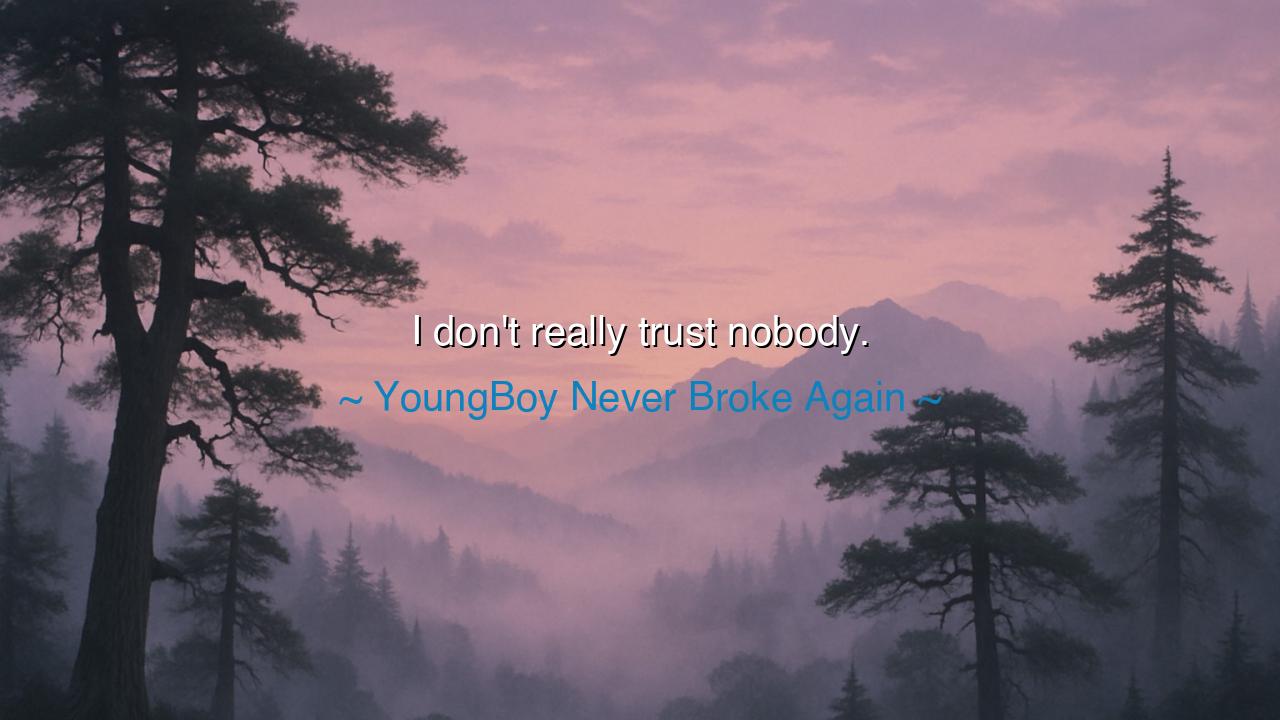
I don't really trust nobody.






Hear now the cry of the young warrior, YoungBoy Never Broke Again, who uttered these words from the furnace of hardship: “I don’t really trust nobody.” This is not the language of ease, nor the speech of one untouched by struggle. It is the raw confession of a soul who has walked among betrayal, who has felt the sting of false promises and the shadow of deceit. These words, though simple, are heavy with the weight of human experience. They echo the ancient truth that trust, once broken, is harder to restore than a shattered stone.
What does it mean to say “I don’t really trust nobody”? It is both shield and wound. It is shield, for the heart that has been betrayed learns to guard itself against further pain. Yet it is also wound, for the one who cannot trust carries loneliness, like a desert without water. In his voice we hear the eternal struggle of mankind: the desire for connection battling against the fear of betrayal. To live without trust is to live in vigilance, yet to trust without wisdom is to invite destruction. Thus, the words speak of a balance not easily found.
History too speaks of men and women who bore this same burden. Consider Julius Caesar, betrayed by those he called friends. Surrounded by daggers, he beheld the face of Brutus, one whom he had trusted as a son. In that moment, he too might have uttered, “I don’t really trust nobody.” And yet, though his trust was shattered, the story of his fall warns us: power without discernment breeds treachery, and misplaced faith can undo even the mightiest.
Yet let us also recall the tale of Frederick Douglass, who in his youth learned the cruelty of betrayal and the emptiness of false trust under slavery’s chains. For a time, he too trusted nobody. Yet through wisdom, he rebuilt trust—not in every man, but in the cause of freedom, in allies who proved themselves by action. By discerning between false friends and true, he found companionship and strength to rise above his oppression. His story teaches us that mistrust may protect us for a time, but discernment leads us to freedom.
O children of tomorrow, take this teaching to heart: there are seasons when trust is dangerous, when the heart must guard itself. But to dwell forever in mistrust is to close the gates of the soul, leaving no path for love, friendship, or peace to enter. If you say, “I trust nobody,” let it be for a moment of defense, not for a lifetime of exile. For life without trust is a fortress that becomes a prison.
The lesson, then, is this: do not offer your trust to all, for not all are worthy. But neither withhold it from those who prove themselves through action, loyalty, and sacrifice. Test the hearts of others as gold is tested in fire. Trust not the tongue alone, but the deeds that endure over time. In this way, you will avoid the ruin of betrayal, yet still partake in the sweetness of companionship.
Practical action lies here: learn to listen more than you speak, to watch more than you presume. Give your trust in measure, not in haste. Let it be earned, not demanded. And when you find the few who are true, cling to them as brothers and sisters of the soul, for such bonds are rare treasures. At the same time, strengthen your heart so that even if trust is broken, you are not undone. For in wisdom, you will stand secure.
So let these words of YoungBoy Never Broke Again become not only lament, but guidance: to trust blindly is folly, but to trust wisely is strength. Guard your heart, but do not harden it. Seek not to trust everybody, but do not condemn yourself to trust nobody. For between despair and gullibility lies the golden path of discernment, where true loyalty may yet be found.






AAdministratorAdministrator
Welcome, honored guests. Please leave a comment, we will respond soon